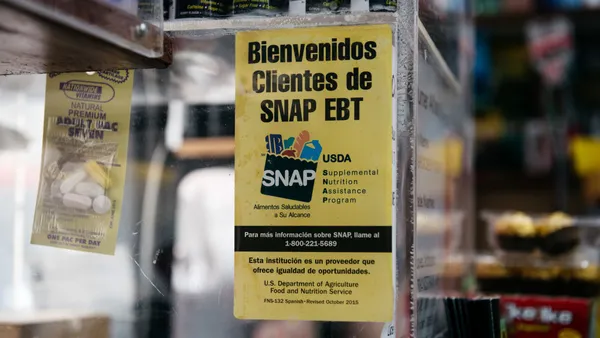Dive Brief:
- SpartanNash recorded a comparable-store sales increase of 5.4% during the first quarter of fiscal 2023 — the grocery distributor and supermarket operator’s slowest rate of growth by that yardstick since Q3 of 2021, when it was 3.1%.
- Sales were up 5.2% during Q1 compared with the same period a year ago, to $2.91 billion, but net earnings fell more than 41%, to $11.3 million.
- Like other retailers, SpartanNash has been dealing with strong headwinds as shoppers constrain their spending amid challenging macroeconomic conditions.
Dive Insight:
SpartanNash has been seeing clear signs that many consumers are under financial stress, and the company has made adjustments in an effort to meet people’s evolving needs, executives said Thursday during an earnings call.
The grocer has focused on its deli and fresh business, and it saw a 50% improvement in sales of prepared and cut fruits and meals during the quarter, suggesting that shoppers are looking for ways to “have something done for them in exchange or in lieu of perhaps dining at a restaurant,” CFO Jason Monaco said.
“We’re looking at the marketplace and finding a way to win in spite of what’s going on or in the market that we operate in,” Monaco said. “We can’t control what the economy does but we can control how we behave in that economy and we can make sure that we win despite some of those headwinds.”
SpartanNash saw its own brand sales grow 50% faster than its overall business in Q1, which concluded April 22, and now has a private label penetration rate of about 21%, Monaco said.
The company also affirmed its guidance for all of 2023, which calls for total net sales for the year to fall between $9.9 billion and $10.2 billion, compared with the $9.64 billion SpartanNash brought in during 2022.
SpartanNash President and CEO Tony Sarsam said the company has taken a number of steps to provide value and convenience to time-strapped shoppers. Those measures include emphasizing digital promotions, expanding relationships with local suppliers, focusing on “personalized value experiences” connected with loyalty offerings and sharpening its private label selection in response to what shoppers want.
Sarsam noted that sales of frozen meals were “still decent for the quarter” despite hefty price increases — a sign that shoppers are willing to pay for convenience even as they look for ways to save money overall.
SpartanNash, which last year overcame a revolt by activist investors unhappy with its strategy and results, has been benefiting from ongoing projects to transform its merchandising and supply chain operations, Sarsam added. The company has focused on “filling as many shelves as possible with the right products at the right place at the right price” and realized millions of dollars in savings in managing its supply network, he said.













